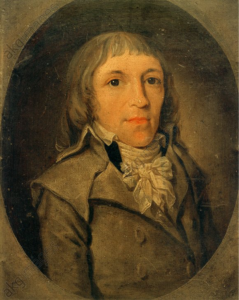In the evening, under the lime tree
(Poet's title: Abends unter der Linde)
Set by Schubert:
D 235
[July 24, 1815]
D 237
[July 25, 1815]
Part of Kosegarten (putative cycle)
Woher, o namenloses Sehnen,
Das den beklemmten Busen presst?
Woher, ihr bittersüßen Tränen,
Die ihr das Auge dämmernd nässt?
O Abendrot, o Mondenblitz,
Flimmt blasser um den Lindensitz!
Es säuselt in dem Laub der Linde;
Es flüstert im Akazienstrauch.
Mir schmeichelt süß, mir schmeichelt linde
Des grauen Abends lauer Hauch.
Es spricht um mich, wie Geistergruß;
Es weht mich an, wie Engelkuss.
Es glänzt, es glänzt im Nachtgefilde,
Der Linde grauer Scheitel bebt –
Verklärte himmlische Gebilde,
Seid ihr es, die ihr mich umschwebt?
Ich fühle eures Atems Kuss,
O Julie, o Emilius!
Bleibt Sel’ge, bleibt in eurem Eden,
Des Lebens Hauch bläst schwer und schwül
Durch stumme leichenvolle Öden.
Elysium ist mild und kühl,
Elysium ist wonnevoll –
Fahrt wohl, ihr Trauten, fahret wohl!
Where are you from, nameless longing,
Weighing on my oppressed breast?
Where are you from, you bittersweet tears
Making my fading eyes water?
Oh sunset, oh moonshine,
Shimmer less brightly around the lime-tree seat!
There is rustling in the lime tree’s foliage;
There is whispering in the acacia bush.
I am being treated sweetly and gently
By the mild breeze of the grey evening.
The sounds around me are like a spirit’s greeting;
The movement around me is like an angel’s kiss.
There is glowing, there is glowing in the realm of night,
The grey tip of the lime tree is bending –
Transfigured, heavenly images,
Is it you who are floating around me?
I can feel the kiss of your breath,
Oh Julie, oh Emilius!
Stay, blessed ones, stay in your Eden!
The breath of life blows heavily and oppressively
Through the silent wilderness full of corpses.
Elysium is mild and cool.
Elysium is full of happiness –
Farewell, friends, farewell!
All translations into English that appear on this website, unless otherwise stated, are by Malcolm Wren. You are free to use them on condition that you acknowledge Malcolm Wren as the translator and schubertsong.uk as the source. Unless otherwise stated, the comments and essays that appear after the texts and translations are by Malcolm Wren and are © Copyright.
☙
Themes and images in this text:
Angels Bending Bitterness Breath and breathing Bushes and undergrowth Chest / breast Eden Elysium Evening and the setting sun Eyes Farewell and leave taking Father and child Ghosts and spirits Grey Heaven, the sky Kissing Laments, elegies and mourning Leaves and foliage Lime trees (Lindenbaum) Longing and yearning Night and the moon Pictures and paintings Sweetness Tears and crying Wind
In Memoriam Julie: Johanna Luise Juliana Kosegarten, 1794 - 1797 Emilius: Karl Johann Emil Kosegarten, 1796 - 1797
Linden (lime) trees are associated with everything that is familiar and homely (trautlich) in the Germanic tradition. They are therefore connected with both lovers and with loss (the pain of separation and homesickness or the heartache of bereavement). In this case, the poet is sitting under a familiar tree, in his usual place, as sunset gives way to a moonlit night, and his thoughts turn to the children (a toddler and a baby) he has lost. Tears well up as the agony is renewed, though they also offer some relief (they are ‘bittersweet’ tears).
As night falls the poet becomes increasingly aware of quiet sounds and gentle movement. There is rustling in the leaves and a very gentle breeze that is experienced as the earth breathing quietly or even an angel speaking very softly. As the tree top above him bends with the wind the poet begins to feel that he is in the presence of Julie and Emilius themselves.
They are breathing but not speaking; they are asleep. They are better off where they are. We cannot wish them back here, where the breath of life is much more disturbed and disturbing. The bereft father is beginning to reach towards the ‘acceptance’ stage of grief.
☙
Original Spelling Abends unter der Linde Woher, o namenloses Sehnen, Das den beklemmten Busen preßt? Woher, ihr bittersüßen Thränen, Die ihr das Auge dämmernd näßt? O Abendroth, o Mondenblitz, Flimmt blasser um den Lindensitz! Es säuselt in dem Laub der Linde; Es flüstert im Akazienstrauch. Mir schmeichelt süß, mir schmeichelt linde Des grauen Abends lauer Hauch. Es spricht um mich wie Geistergruß; Es weht mich an, wie Engelkuß. Es glänzt, es glänzt im Nachtgefilde, Der Linde graue Scheitel bebt - Verklärte himmlische Gebilde, Seid ihr es, die ihr mich umschwebt? Ich fühle eures Athems Kuß, O Julie! o Emilius! Bleibt Sel'ge, bleibt in eurem Eden! Des Lebens Hauch bläst schwer und schwül Durch stumme leichenvolle Öden. Elysium ist mild und kühl. Elysium ist wonnevoll - Fahrt wohl, ihr Trauten! fahret wohl!
Confirmed by Peter Rastl with L. T. Kosegarten’s Poesieen, Neueste Auflage, Dritter Band, Berlin 1803, pages 201-202. This is the source used by Schubert. Kosegarten’s poem is slightly different in later editions
To see an early edition of the text, go to page 201 [205 von 274] here: http://digital.onb.ac.at/OnbViewer/viewer.faces?doc=ABO_%2BZ184217108


